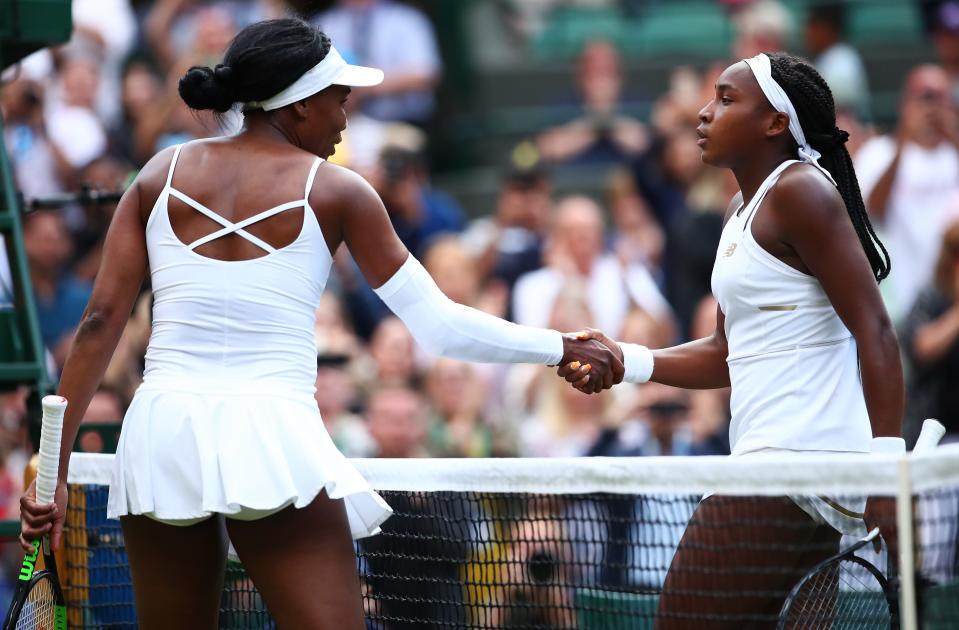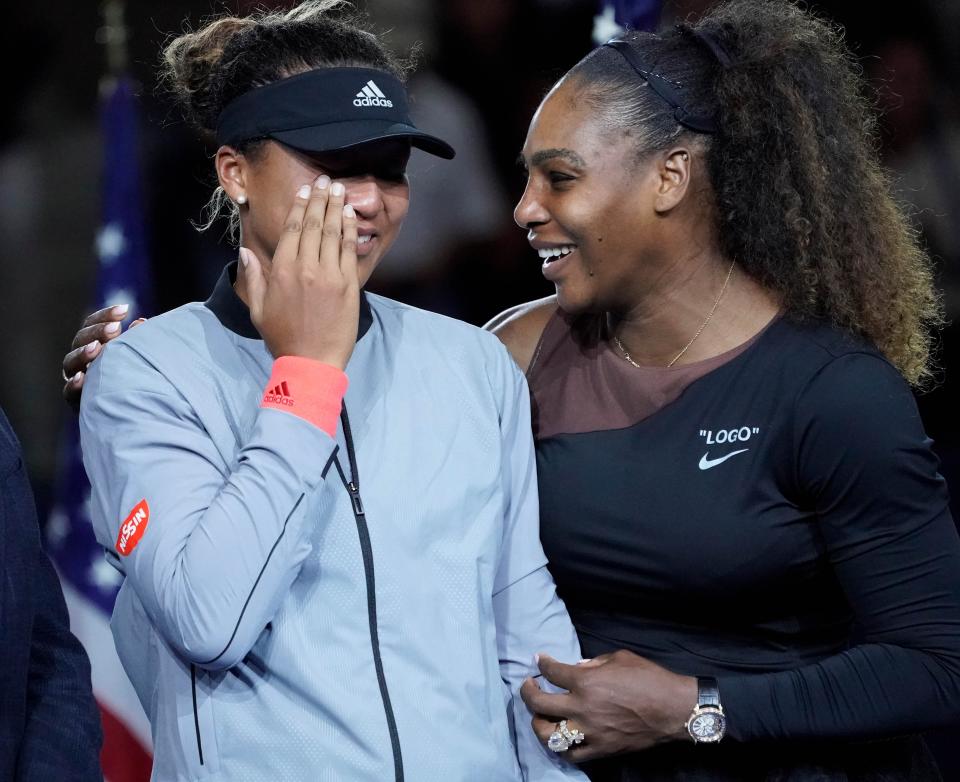Serena and Venus Williams aren't at US Open, but their presence is seen and felt everywhere
NEW YORK — Coco Gauff sat in an interview room in Flushing Meadows on Monday night, fresh after defeating her opponent, Magda Linette, in three sets. It was Gauff’s first-round match at the U.S. Open, where she is among 11 teenagers in this year’s draw, but Linette didn’t make it easy. At match point, after Linette had nearly evened the scales at 4-5, when the pressure was at its highest, Gauff did what she does best. She stepped into the moment.
Gauff fired a 106 mph serve and Linette, who was caught on uneven footing, returned a forehand that dropped about mid-court. Sensing that her opponent was vulnerable, Gauff smacked it back, darting to the net, where she lunged right to place a crosscourt backhand volley that would have taken somewhat of a miracle to run down. Gauff lifted her hands, bending over and letting out an emotional scream before she exited the court as the crowd erupted into applause.
It was Williams-like aggression, but much of the Williams sisters’ game has found its way into Gauff’s style of play. She’s said that she models her service motion after Serena’s, and is prone to taking large, sweeping swings at the baseline. She’s long-legged and athletic, like Venus, and has even been known to let out a full-throated, “Come on!”
But the biggest similarity might be in attitude. Gauff isn’t just aggressive; she’s fearless, almost as if she’s immune to the expectations swirling around her. Venus had this quality, too, especially early in her career. At 17, Williams burst from relative anonymity into the finals of the world’s biggest stage at the U.S. Open in 1997, and won in her debut appearance, with seemingly not a care in the world.
When Gauff is pounding winners on the baseline, it’s easy to forget that she’s not even a legal adult. It’s easier to remember that in the post-game press conferences, when the light-hearted child comes out, as it did Monday, when she was asked how different the Open felt without the Williams sisters. It’s the first time they’ve both been absent from the tournament since 2003.
“That’s crazy,” she said. “That was before I was born. I didn't realize every year I've watched or played the U.S. Open they've played it.”

Some of Gauff’s earliest memories are at the U.S. Open, an event she’s attended since she was 8. She says she came to the Open with one purpose: To watch the Williams sisters. Coming from Florida, travel and tournament tickets were expensive, but well worth the money for an impressionable young athlete.
At 8, Gauff sat in the first row at Arthur Ashe Stadium, under the same lights she would one day play under. She watched closely as a long-legged, athletic, Black women’s player named Venus showed her fearlessness, and took note. After the match, when they were passing tennis balls to the crowd, one of the balls dropped back on the court.
“It looked like she told the ball kid to give it to me,” Gauff said, “because the ball kid directly gave the ball to me. I just remember being so excited.”
Venus and Gauff have since developed a relationship, which began when Gauff defeated Williams at Wimbledon in 2019, in straight sets. She was 15, and after winning, sat in her chair and cried into a towel, almost as if she were apologetic for the outcome. She thanked Venus for how she’d influenced her career, and said later that the Williams sisters were her heroes.
You could argue that these moments best illustrate the impact that Serena and Venus have had on the next generation of women’s tennis players. When Naomi Osaka defeated Serena to win her first U.S. Open in 2018, she wept. Boos rang through Arthur Ashe, as Williams consoled her.
“I know that everyone was cheering for [Williams], and I’m sorry it had to end like this,” Osaka said.
Like Gauff, Osaka grew up watching Venus and Serena on television. Like Gauff, Osaka’s father modeled his coaching after Venus and Serena’s father, Richard Williams. And like Gauff, Osaka shed tears after watching her hero stumble.

Venus is 41 now; Serena, 39. Both are rehabbing injuries, which is why they pulled out of the Open. Their absence is noted by a generation of young stars, who know that the women who laid this groundwork are entering a different phase of their lives.
But that groundwork is alive and well and can be seen throughout this tournament. Sloane Stephens grew up with a poster of the Williams sisters on her wall. Gauff plays with the aggression of Serena and the fearlessness of Venus. Osaka says the sisters inspired her to play tennis.
“It was not easy to see,” Gauff said, after her match Monday. “Obviously, the reason why I'm here is because of them.”
Follow Alex Coffey on Twitter @byalexcoffey
This article originally appeared on USA TODAY: Serena and Venus Williams aren't at US Open, but influence everywhere

